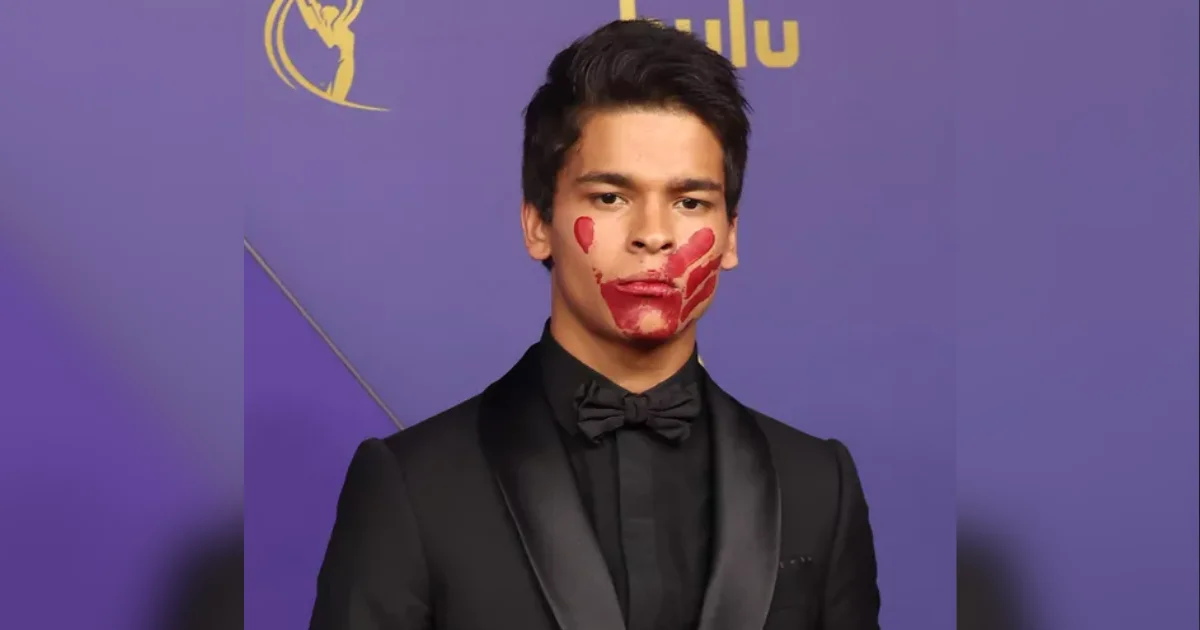D’Pharaoh Woon-A-Tai credit-Amy Sussman/Getty images
D’Pharaoh Woon-A-Tai, a rising Native American actor and 2024 Emmy nominee, used his platform at the Emmy Awards to make a powerful statement about a pressing issue affecting Indigenous communities. Without saying a word, Woon-A-Tai’s bold red handprint across his face spoke volumes, symbolizing his support for the Missing and Murdered Indigenous Women (MMIW) movement, a cause close to his heart and heritage.
A Symbol of Silence: The Red Handprint
Walking the red carpet in a sleek black tuxedo, Woon-A-Tai adorned his face with a striking red handprint over his mouth, a symbol recognized by many as representing the MMIW movement. This handprint is a poignant visual for “all the missing sisters whose voices are not heard,” according to Native Hope, an organization advocating for Indigenous rights. It reflects the silencing of Indigenous women by media, law enforcement, and society, highlighting the epidemic of violence against Native women.
The crisis, long underreported, is staggering in its scope. The Bureau of Indian Affairs references a 2016 study by the National Institute of Justice, which found that more than 80% of American Indian and Alaska Native women have experienced violence in their lifetime. Over half (56.1%) have been victims of sexual violence. Woon-A-Tai’s statement at the Emmys amplified awareness of this critical issue, aligning with the MMIW’s mission to end the epidemic of violence and honor the lives of missing and murdered Indigenous women.
Representation and Storytelling in Native Communities
D’Pharaoh Woon-A-Tai, who identifies as Oji-Cree First Nations and Guyanese, has long been a vocal advocate for Native Americans to take control of their own stories. His Emmy nomination for portraying Bear Smallhill in FX’s Reservation Dogs is a milestone for Indigenous representation in television. The series, created by Indigenous filmmakers, centers on the lives of Native American youth living on a reservation in Oklahoma, authentically portraying their struggles, culture, and humor.
In previous interviews, Woon-A-Tai has spoken out about the importance of Indigenous voices in media. “I think we’re pushing to a time when we don’t need anybody to tell our story for us,” he told Elle magazine, advocating for Native directors, writers, and casting directors to be central to any project involving Native stories. His performance in Reservation Dogs has been widely praised, and his role as an advocate for authentic Indigenous representation continues to resonate within Hollywood and beyond.
FAQ About D’Pharaoh Woon-A-Tai
Who is D’Pharaoh Woon-A-Tai?
D’Pharaoh Woon-A-Tai is a Native American actor best known for his role as Bear Smallhill in the FX on Hulu series Reservation Dogs. He is of Oji-Cree First Nations and Guyanese descent and has used his platform to raise awareness about Indigenous issues.
What does the red handprint on his face symbolize?
The red handprint over his mouth is a symbol of the Missing and Murdered Indigenous Women (MMIW) movement, representing the silencing of Indigenous women whose disappearances and deaths have often gone unreported or unresolved.
What is D’Pharaoh Woon-A-Tai’s stance on Native storytelling?
Woon-A-Tai is a strong advocate for Indigenous people telling their own stories. He has spoken about the need for Native filmmakers, writers, and casting directors to be involved in any media projects that feature Indigenous narratives.
What is Reservation Dogs about?
Reservation Dogs is a comedy-drama series that follows a group of Native American teenagers living on an Oklahoma reservation. It explores their daily lives, challenges, and dreams, providing a fresh and authentic perspective on Indigenous life in contemporary America.
